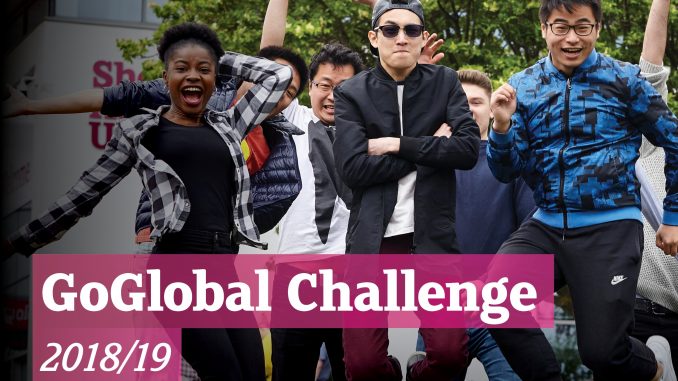
We are pleased to announce the first four GoGlobal lectures. We will be adding further lectures soon and will e-mail you once they are confirmed. Please click on the relevant link to book your place.
22 November 2018, 5 – 6.30pm
What causes migration?
A GoGlobal Challenge Lecture by the Refugee Council
In first three months of 2015, at height of the refugee crisis in Europe, nearly half a million people arrived at Europe’s Mediterranean shores and made their journey across Europe seeking asylum. With the unprecedented volumes of new arrivals, even the best-prepared European countries reached a breaking point in their ability to offer refuge. This caused political tensions across Europe and led to the increase of anti-immigrant rhetoric in the UK.
In this lecture Tesfom Tsegazghi and Jack Owen from the Refugee Council will help you understand what causes migration. We will discuss challenges that refugees face on their journey to Europe and the difficulties they face when they arrive here. What is our role as individuals in this and what can we do?
29 November 2018, 5-6.30pm
Who needs cultural intelligence?
A GoGlobal Challenge Lecture by Anja Louis
Cultural Intelligence, or CQ, measures your capability to relate and work effectively in culturally diverse situations. Your CQ predicts your readiness for working and relating effectively with people from different cultural backgrounds. The higher your CQ, the more likely you will gain new opportunities, earn higher wages, and experience success working in today’s diverse, globalised world.
In this entertaining lecture Dr. Anja Louis from Sheffield Business School will explain how you acquire cultural intelligence and what happens if you don’t bother!
7 February 2019, 5-6.30pm
Is poverty a human rights issue?
A GoGlobal Challenge Lecture by Dr Thomas Bundschuh
On our TV screens we regularly witness poverty and destitution experienced by people living in the Global South. We also see that people do not only want to escape from war zones but also from extreme poverty, often at the root of violent conflict. But misery is not only in far-away lands. A close look at the UK’s population reveals that “14 million people, a fifth of the population, live in poverty. Four million of these are more than 50% below the poverty line, and 1.5 million are destitute, unable to afford basic essentials. The widely respected Institute for Fiscal Studies predicts a 7% rise in child poverty between 2015 and 2022, and various sources predict child poverty rates of as high as 40% (Alston 2018, 1).”
Hence the question which must be asked: “Is poverty a human rights issue?” Are human rights disregarding the interests of poor people? Or do human rights empower people facing poverty? These questions lead to further questions such as: What are human rights about in the first place? Who cares or should care about human rights? What is the role of the Human Rights Act?
The lecture will shed some light on these questions. It will address issues that concern the elimination of poverty, on the one hand, and the realisation of human rights, on the other hand. It will become clear how poverty and human rights are related and how living in dignity is a matter of human rights for all and thus a truly “glocal” challenge.
27 February 2019, 5 – 6.30pm
Did fake news break the news?
A GoGlobal Challenge Lecture/Workshop by Dr Lada Price, Dr. David Clarke and Helen Johnson
Recently, the former editor of The Guardian Alan Rusbridger stated that there was too much false news, not enough reliable news. Worryingly, he predicted that soon entire communities will find themselves without news, or without news they could trust.
This workshop will focus on the problem of ‘fake’ or false news. We will examine contested definitions, the variety of forms that it takes and its harmful impact on journalism and on society. We will look into how misinformation spreads and the role of online social media in creating and exacerbating echo chambers and filter bubbles.
5 March, 5- 6.30pm
Global Warming & Environmental Chanege, a point of no return or a call to action?
A GoGlobal Challenge Lecture by Professor Ian D Rotherham
The authors of the UN landmark report released this October say that urgent and unprecedented changes are needed to avoid global warming reaching levels which will significantly worsen the risks of drought, floods, extreme heat and poverty for hundreds of millions of people.
In his lecture, Prof Ian Rotherham will lead a discussion about how humanity, and each one of us individually, should respond to this wake-up call for action. We will also discuss the now infamous Sheffield street-tree scandal and what it says about our community. How can we demand that communities elsewhere take action on climate change, when at local level, we seem to not care?
You may find the following preliminary reading useful: We have 12 years to limit climate change catastrophe, warns UN, || Overwhelmed by Climate Change? Here’s what you can do
21 March, 5-6.30pm
The privilege of whiteness
A GoGlobal Challenge Lecture by Dr Muna Abdi and Aloma Onyemah
Scholars such as W.E.B. Du Bois, James Baldwin and Ida B. Wells have written extensively about Whiteness as a Global system that Privileges some and disadvantage others.
This lecture offers an introduction to an understanding of Whiteness as a construct, with reference to empire and colonisation. We will examine the development of racist global systems and how they structure and impact on the education, travel, marketing and charity sector. In preparation for the lecture you may want to read ‘White Privilege: Unpacking the Invisible Knapsack’ by Peggy McIntosh (1988): https://www.racialequitytools.org/resourcefiles/mcintosh.pdf
Aloma add to the lecture looking at the dynamics of fragility and alliance in organisations. She will explore the intricate dynamics of ‘White Fragility’ and how this acts as a barrier to meaningful engagement and action to address racial inequalities in organisations.
